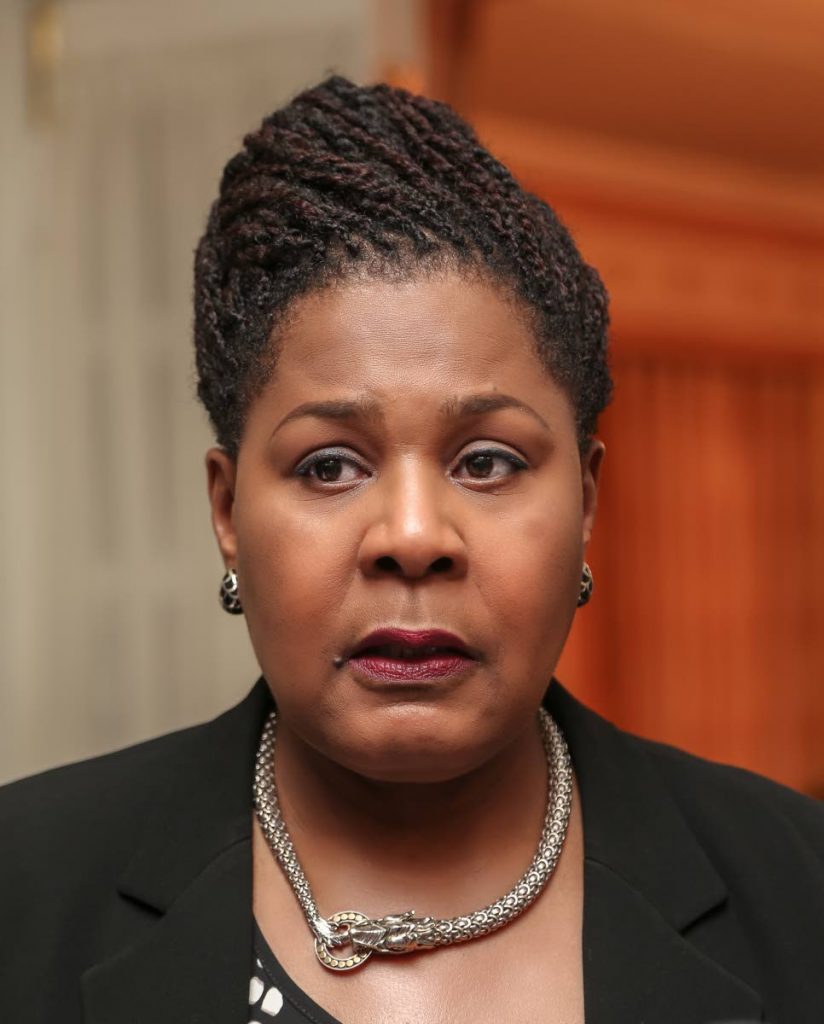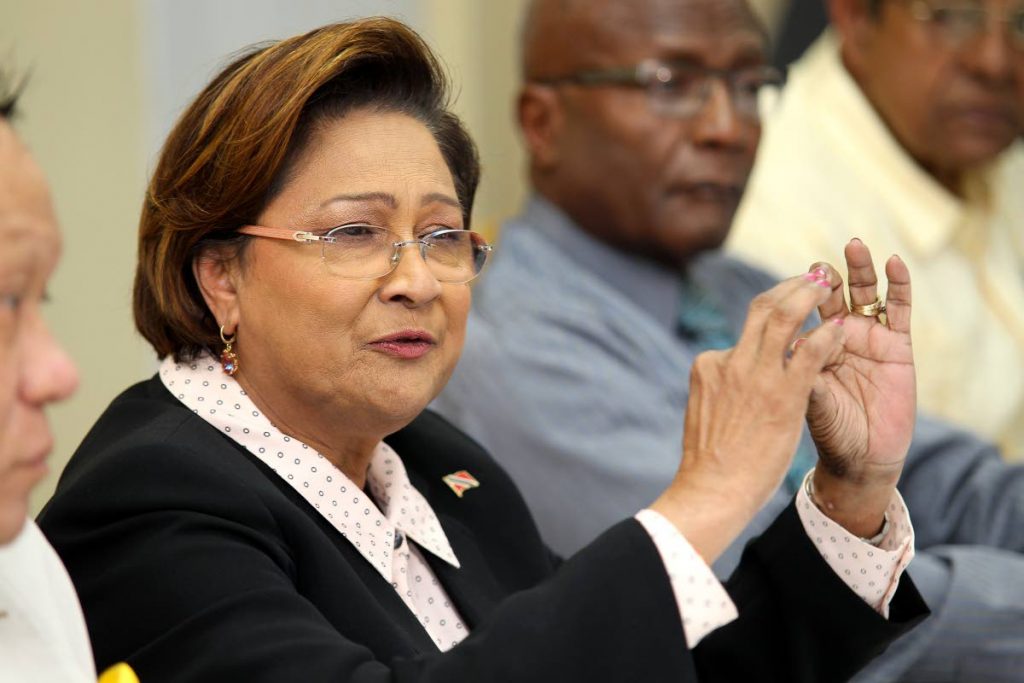NO KAMLA, NO

PRESIDENT Paula-Mae Weekes is adamant that she will not disclose the names of judges considered for appointment to the Judicial and Legal Service Commission (JLSC) and has assured that she has conducted her due diligence exercise in recommending Justice of Appeal Charmaine Pemberton’s re-appointment.
And equally insistent that the President not become a rubber-stamp in her selection to the JLSC is Opposition Leader Kamla Persad-Bissessar.
Both women sent off a flurry of correspondence to each other, this month, on the consultation process.
In February, Weekes proposed to correct an error in Pemberton’s appointment under section 110 (3) (b) of the Constitution and have her re-appointed under the correct provision: section 110(3) (a).
The President wrote to Persad-Bissessar seeking her views as directed by the Constitution for the appointment of members to the JLSC.
The “error” in Pemberton’s appointment was discovered after UNC activist Devant Maharaj, through his attorney Gerald Ramdeen, wrote to Weekes. She replied to Maharaj, explaining what the error was and said it would be corrected at the earliest opportunity.
However, Persad-Bissessar said before she could give her views, she wanted to know “in the need for transparency and fairness in the consultation process” the names of the other judges considered and whether there were any complaints to the Chief Justice, the JLSC, lawyers or litigants on Pemberton’s conduct or any other nominee.
Weekes, in her reply to the Opposition Leader, refused the requests. She said to disclose the other nominees might only serve to embarrass unnecessarily those who were not chosen and, also suggested that Persad-Bissessar use the “constitutional heft” of her office to make her own enquires of the Chief Justice and the JLSC.
She said she did not understand the disclosure request to be part of the consultation process. “In any proposed appointment, one or more persons might be contemplated and from among them the President makes what he or she considers the most appropriate choice. The Prime Minister and Leader of the Opposition are then invited to express their views, including but not limited to objection to the appointee.
“I do not see this process as one of a winner and 'also rans' and neither in this, nor any other, proposed appointment do I intend to disclose whom, other than the appointment, has been considered."

However, Persad-Bissessar said she was disappointed by this and disagreed with the President. She also said she had some difficulty with the President’s proposal that she make her own inquires of any complaints about any of the nominees. “Whilst you appreciate that this ‘may indeed be a matter relevant to your consideration,’ it would appear that you consider such an inquiry to be part of my duty,” Persad-Bissessar wrote on March 7.
She also asked Weekes to reconsider her position, pointing out that the JLSC members were appointed by the President and was an independent body falling within the remit of the Office of the President.
“Your Excellency would be expected to perform her own ‘independent due diligence including investigating any cause for concern’ before she proposes a nominee for the consideration of the Prime Minister and Leader of the Opposition,” Persad-Bissessar said, adding, “I therefore seek your assurance that Your Excellency performed her own due diligence.”
She also mentioned that the UNC was involved in several high-profile sensitive cases, which included the election petitions and there was a real risk that a request for information on complaints could be perceived as "a lack of confidence” in the person and have “obvious undesirable implications for the administration of justice.”
She instead suggested that the Office of the President would be better positioned to make the requests, as it was “neither appropriate or proper for a Leader of the Opposition” to do so.
“We must, therefore, revisit and review the consultation process in the public interest to ensure it could withstand public scrutiny and produce the best possible appointment to serve on the JLSC. The standard operating procedure is not cast in stone and the unprecedented developments that have brought us to this precipitous state of affairs demands no less.
“Your Excellency is considering a fresh appointment to the JLSC under s110(3)(a) of the Constitution. In so doing, you must address your mind to the pool of potential candidates and consider the experience, merit and ability of the various judges. It would be wrong to approach this exercise as though you are restricted to merely rubber stamping your predecessor’s choice," Persad-Bissessar said.
In a response on March 13, Persad-Bissessar said an approach to any judge required utmost diplomacy and discretion and she was “uncomfortable” with the idea that she should do so personally.
She also suggested it would be inappropriate to propose alternative candidates to the post.
“Many may question the proprietary of any approach to serving judges by a sitting politician ‘to ascertain their willingness and availability to serve’ on the JLSC. It arguably puts judges in a compromising position as they would not wish to fall victim to the perception of apparent political favouritism,” the Opposition Leader said.
She also said she wished to avoid putting her party and any judicial officer in an “unnecessarily embarrassing position.”
In a previous letter, dated March 8, the President reiterated that some nominees never know they were considered and those approached do not know if they were the only ones. She said she favoured that process and promoted discretion and avoided any sense of competition or disappointment.
Weekes also assured she conducted her due diligence and admitted she “chuckled” at Persad-Bissessar’s urging that she not be a rubber-stamp to her predecessor’s choice.
“The suggestion that I might be was a first,” the President said.
She was adamant that she did not consider it prudent, nor did she intend, to share with either the Prime Minister or the Leader of the Opposition, the factors that were considered in arriving at any proposed appointee.
She also did not share Persad-Bissessar’s “bleak view” that an inquiry of her own of the CJ or the JLSC courted a “real risk” to the UNC, saying she was comforted that any case involving the party would be presided over by a panel in the appellate court and the right to appeal was alive.
In her last letter to Weekes, the Opposition Leader said it appeared she had not been able to persuade the President that her due diligence should have included the issue of complaints, and said she was “compelled to make the necessary inquiry and shall do so as a matter of urgency.”
She requested of the President, in the meantime, to hold her hand on taking any further step with the appointment.
“It would be a serious error of judgement on our part if we were to appoint someone without first making these basic inquiries,” she said, as she previously cited the bungling of the appointment of the former chief magistrate Marcia Ayers-Caesar to the bench.
Persad-Bissessar also told the President her warning against the perception of being a rubber-stamp was merely in response to her proposal to rectify the error in Pemberton’s instrument of appointment as opposed to giving fresh consideration to fill the vacancy.
“I am consequently prepared to accept that your Excellency has, by sheer coincidence, selected the same candidate,” adding that she was also prepared to accept that the President remained genuinely receptive to suasion on the appointment and it was not a foregone conclusion.
Members of the JLSC are appointed by the President and Pemberton was appointed to the JLSC in 2017 by former president Anthony Carmona.
The JLSC is chaired by CJ Ivor Archie and currently comprises head of the Public Service Commission Maureen Manchouck, attorney Ernest H Koylass, SC, Justice of Appeal Charmaine Pemberton, and Nicole Beaubrun-Toby, according to its 2017 report.


Comments
"NO KAMLA, NO"